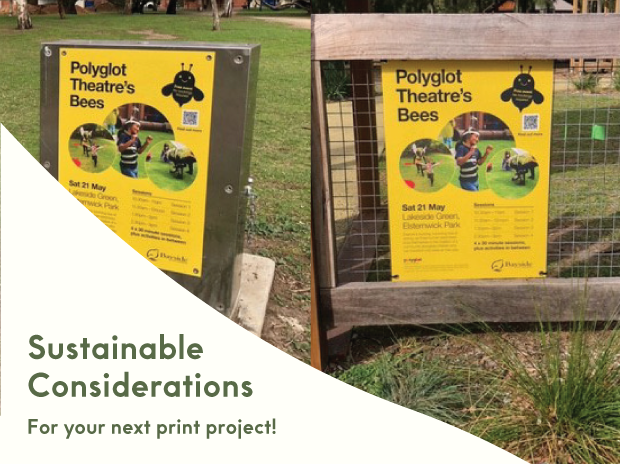- Environmental Management Systems (EMS) – ISO14001
- Made or certified Carbon Neutral

Sustainable Considerations
Sustainable Considerations for your next Print Project!
I’m sure most of you will agree that we have seen a monumental leap in the considerations taken when sustainably sourcing materials for printed projects. When I first started as a part of the paper and print industry nearly twenty years ago, most enquiries relating to specifying a paper was finding out which of our the papers were made with recycled fibre. As simple as that!
Let’s quickly go through some of the key areas to look at when going through the options with a client. First educate your client on the facts available to you and ask what is most important to them based on the message they want to convey to a wider audience through their stock selection.
Fibre Source
Q. Recycled or Virgin fibre?
A. Both!
Paper made with recycled fibres use an available resource and in turn diverts waste from landfill. Keep in mind that recycled fibres are not infinitely recyclable as the quality of fibre degrades each cycle. Virgin fibres are needed to replenish and maintain quality of recovered fibre in circulation. In turn this enables the strength, quality and availability of product to be maintained in a sustainable manner. FSC or PEFC certified virgin fibre is sourced from managed plantations, these production forests protect existing natural forests from illegal logging practices. By choosing to use an FSC or PEFC certified product you are supporting a resource that is responsibly managed, sustainable and 100% recyclable. If you are using an FSC or PEFC certified printer you are able to use the appropriate logo from the certifying body for use on your printed piece.
In essence, choosing a paper made from recycled fibre or responsibly managed production forests are equally great sustainable paper choice as you are contributing to the “cradle to cradle” circular economy created by the pulp and paper industry. Environmental manufacturing accreditations

 Footy Tips
Footy Tips